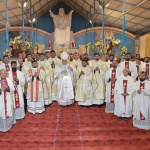The Carmelite Order took its origin in the slopes of Mount Carmel where the Prophet Elijah and his followers were living in the presence of God. They were zealous for His glory and were going out to bring the erring people of God to the true path. The prophet was fed by food from heaven and had foreknowledge about the Virgin Mother of God. When the Carmelites see the prophet Elijah, they see their life reflected in the prophet as if in a mirror – the contemplative ideal, the fraternal communion and veneration of the Blessed Virgin Mary. In this sense Elijah the Prophet was called the founder of the Carmelite Order. But a historical note about the Carmelites dates only from the 11th century when St. Albert, the Patriarch of Jerusalem gave them a rule of life approved by Pope Eugene IV. The Order underwent different changes and mitigations all throughout the centuries.
The great St. Teresa of Avila and St. John of the Cross who reformed the Carmelite Order, did not break the past nor introduced anything new but they introduced the former Spirit of the Order prayer, contemplation, divine office, celebration of the Eucharist, practice of the presence of God, devotion to Blessed Virgin Mary. The missionary dimension was so dear to St. Teresa of Avila.
From the time of St. Teresa we see the reformed Carmelites going to different parts of the world and specially to India, eg:- Malabar Vicariate (Vicariate of Varapoly) 1659, Vicariate of Mogul 1720, Vicariate of Quilon 1845.
To form an indigenous Carmelite clergy it took them at least two centuries. While the Spanish Carmelites of the Vicariate of Varapoly opted to train the indigenous clergy, the Belgium Carmelites took the initiative of forming an indigenous Carmelite Clergy. Accordingly the Carmelite Novitiate was founded in Trivandrum and Margoa. Both Latins and Syrians were existing together in the Malabar circumscription, the first province of the Discalced Carmelites in India.
When the Discalced Carmelite family in India was rearranged by Fr. Philip Saize de Baranda, the Superior General in 1981 into different circumscriptions, those 10 Latin members from Malabar Province were assigned to St. Joseph Monastery, Varapuzha on 10th April, 1981 to form an independent community under the General Definitory. It was then christened “Varapuzha Unit”. Though a Commissary was appointed, it was soon dropped. In 1982, the Unit was permitted to promote vocations from all over Kerala of the Latin Dioceses. Zealous and numerous candidates began to flow in, that they had to build an Aspirants’ House at Chittattumukku in Trivandrum in 1984. On December 8, 1983 itself Novitiate had to be opened at Varapuzha, which was eventually shifted to Perumkulam on 4th December 1989.
A new era dawned when Varapuzha Unit was raised to the status of Provincial Delegation on December 28, 1987. Once the novices made their simple Profession, the necessity of a Philosophy College became imminent, which was materialized on September 12,1992 with the foundation of Juan Jyothi, Carmelite Theology College at Ayroor. Till then the Philosophy Students were lovingly cared for by Manjummel Province. The Theology Students were sent to the International College in Rome or to Carmelaram in Bangalore or to the Pontifical Seminary at Alwaye.
In the year 1992, a territorial adjustment was made by Fr. Camilo Maccise, Superior General between the Province of Manjummel and the Varapuzha Provincial Delegation. Accordingly two houses, St. Peter’s Monastery, Bethsaida and St. Aloysius Monastery, Kottiyam were transferred to the Delegation and the Monastery of Varapuzha was given to Manjummel Province. The Solemnly professed members were
given option to join the circumscriptions of their respective origin. The Delegation was assigned to the Southern Region of Kerala for its expansion and vocation promotion. At this decisive juncture of its growth, by the decree of the Definitory of 21st December 1992, Varapuzha Provincial Delagation was raised to the status of General Delagation under the name South Kerala.
In March 1996 with the inauguration of the new Philosophy College at Ambalapuzha in the Diocese of Alleppy, the General Delagation reached a certain degree of self-sufficiency regarding its formation houses. During the Provincial Chapter of March 1996, the General Delegation was declared as Commissariate. The General Definitory raised the Commissariate into a full-fledged Province on 29th of May 2001 which was officially declared on 15th of October 2001 at Kottiyam.
Glacing through the above pages we are taken back by the provident hand of God who guides the destiny of the whole mankind and who brought the Varapuzha Unit to the full-fledged status of the South Kerala Province. All the members of this Province in unison folded arms to thank God, all the missionaries, our Superiors and all those who have been instrumental in the realization of the South Kerala Province of St. Joseph.
Today, the South Kerala Province which had a humble origin in the state of Kerala is stretched out to different states of India like West Bengal, Assam, Arunachal Pradesh, Meghalaya, and Mizoram through the determined and constant missionary efforts of its members. We too have our presence in countries like Germany and Italy where our friars render very praiseworthy service to different parishes. The Province at present is comprised of 112 priests and 8 solemnly professed religious. Among the 23 houses that belong to the Province 14 are erected and 9 are non-erected. We look after 16 parishes in our different centres (10 in Kerala & 6 in North East India) at the request of respective local ordinaries. The Province runs 6 schools in the mission areas and has 5 boys’ homes and 3 girls’ homes under its custody of which one boys’ home is in Kerala. We are engaged in social service through 3 of our Social Service Centres (of which one is in Kerala) and in spiritual ministry through our retreat centre at Bethsaida in Trivandrum, Kerala. Four Discalced Carmelite Cloistered convents, two in Kerala and two in West Bengal come under the jurisdiction of the South Kerala Province.





